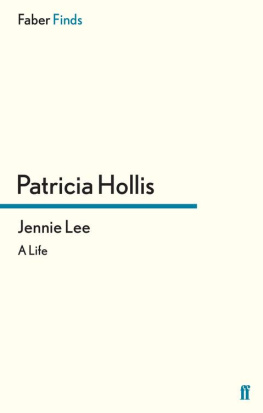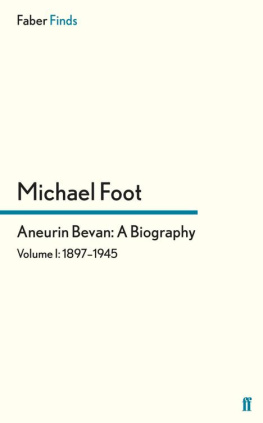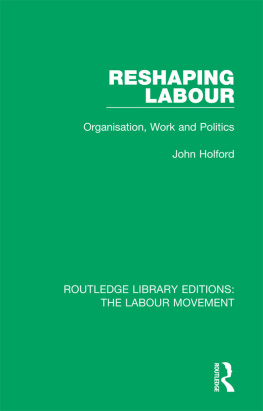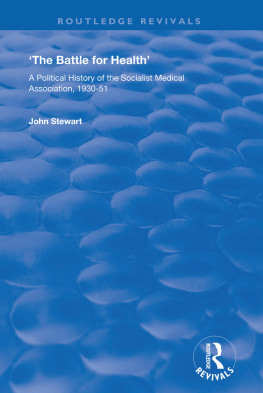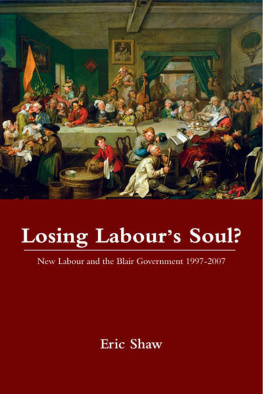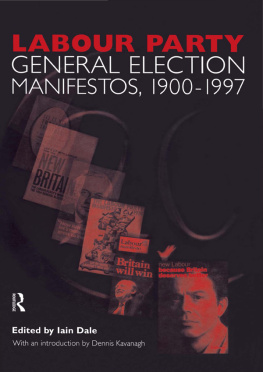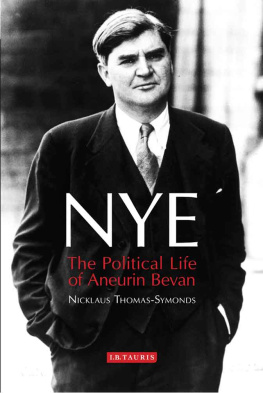Jennie Lee: A Life went to its publisher on May Day 1997. A few months later I was at a friends book launch. An elegant couple in their eighties came over to say that they had both known Jennie well. Indeed, Jennie had an affair with my father, said she. And her father was? Sir Charles Trevelyan, Minister for Education in the 1920s, and Jennies good friend, and political mentor. I demurred, as their lengthy correspondence suggested affection (rather matter-of-fact in her case), not sexual intimacy. Indeed it was Trevelyan who had facilitated Jennies love affair with the married Frank Wise and who nursed her after her collapse on his sudden death. But Lady (Marjorie) Weaver insisted. My mother was convinced of it. They all knew it.
It would certainly explain the unabashed way in which Jennie asked her Dear Man for money for a car, a holiday, for bar fees, medical expenses, for elections, for her family. And why Trevelyan wanted her, in vain, as his parliamentary under-secretary. Certainly Trevelyan was rich, handsome, older (much older sixty years old to her twenty-six years when they met), and potent (attributes, especially the potency, that Jennie was keen on). Jennie, passionate, and quite lovely, was forever fending off male advances, except when she didnt; she had a decidedly relaxed, male attitude to sex. Her forays were not affaires (except for those discussed in the biography), but fairly frequent nights with comrades good friends, not casual, but not carrying any emotional commitment either.
I had presumed that Trevelyan (brother of G. M. Trevelyan, and a Labour grandee with a charming, loving wife) had a conventional private life. There is little in A. J. A. Morriss C. P. Trevelyan, Portrait of a Radical (1977) to suggest otherwise. His own letters to his wife, Dearest of All, were intimate and affectionate, though often given to worries about Jennies struggles. He reassured his sceptical wife that he was to this poor little girl... what you would wish, a kind father helping her all I can. And, on Frank Wises death, If her life isnt broken, it will be because she has me to sob her heart out to.
However, a recent memoir of the Trevelyan family (Laura Trevelyan, A Very British Family, 2006) reveals his promiscuity, including fathering a child with his secretary in his seventies. Jennies closest friend Suse Saemann believed that, though Trevelyan loved Jennie, their friendship was platonic; Michael Foot rather doubted it. I then reread all Jennies letters to him, and I am still not sure. It was a key friendship for her, perhaps under-written in my book. Lady Trevelyan might have been right after all.
I was then introduced to the husband, Sir Toby Weaver, a highly distinguished civil servant in the Department of Education and Skills (DES) during Jennies years. And did he enjoy working for Jennie? Not a bit. He found her deeply unpleasant. She treated us all like butlers. Jennie, irresistible at twenty-six, imperious at sixty-two.
So one of the sad things about finishing a biography is that material still comes in after the book is out, prompted because the book is out. A new preface offers the opportunity to adjust the portrait perhaps a little, especially on her private life, where some reticence that once seemed appropriate is no longer needed. And it also offers the chance to reflect further on some of the conclusions offered back in 1997, not so much on Jennies achievements in the arts and with the Open University, of which I am an unstinting admirer, but of her ministerial style, where I am not. She achieved more than any junior minister I know; and every junior minister I know would also have found her a very difficult colleague. I perhaps appreciate now, which I didnt in 1997, that for Jennie the one made possible the other. And I now doubt that she could have been a minister today.
With that in mind, what would I now add, or perhaps modify?
The biography sought to tell three stories. Jennies stormy political life within the Independent Labour Party (ILP), an MP before she could vote, and her disastrous alienation after 1931 from the Labour Party which sent her into the wilderness; then, her life with Nye as she supported him through the turbulent Attlee/Gaitskell years; and finally her flowering after Nyes death as the first and defining Minister for the Arts and founder of the Open University.
Jennie was the brave, beautiful, impatient, passionate daughter of ILP Scottish miners, a young woman MP untouched by the suffrage movement who was dismissive of feminism as sectional (unlike mens issues, which were not), a mesmerising crusading ILP orator, protg of Jimmy Maxton and so an instinctive uncompromising dissenter.
The ILP, she knew, carried the socialist flame. It had determined in 1930 to be bound only by ILP conference decisions, even, and especially, when they differed from those of the Labour Party. It would not accept the Labour Partys standing orders. By that logic, of course, the Labour Party would fragment into a myriad of affiliated societies each with their own mandate.
Ernie Bevin would have none of that. The trades unions, angry at the cuts in unemployment benefit and then outraged by Ramsay MacDonalds desertion into the 1931 National Government, wanted their party back, but properly disciplined. Only they could defend labour. Bevin and Walter Citrine regarded the ILPs organised conscience and intransigent far-left sectarian identity within the Parliamentary Labour Party (PLP) with the same loathing as they did the Communist Partys activity in their own unions. Not that the unions saw much difference between the two. In turn, Jennie and the ILP saw the trades unions as sectional, their own ILP campaign for a living wage and family allowances to boost an under-consumptionist economy thwarted by trades-union insistence on free collective bargaining.
Jennie never valued the moral authority behind trades-union solidarity. She never understood the difficulties of minority government. She never really understood power. At heart, she was a platform campaigner, not a serious politician: words would bring down the walls.
So Jennie knowingly chose to derail her political career, campaigning for the ILP in 1932 to disaffiliate from the Labour Party, despite all of Nyes verbal abuse and Trevelyans argument, into the purity and impotence of opposition, remaining out of the Commons until 1945.
Prompted by Gordon Brown, I drew on the 1920s Fife press, carefully archived by a local retired miner, Jim Campbell, to understand the back story to what she later called her silliest decision. (I tried to reimburse Mr Campbell for my dozens of photocopied sheets of faded newsprint. He would have none of it. Gordon looks after me.) More recent books, by David Howell, MacDonalds Party: Labour Identities and Crisis, 19221931 (2002) for example, have enriched our understanding of those ILP and MacDonald years; and have brought out for me more clearly the effective marginalisation of the ILP by the trades unions after 1931; also, how Jennie colluded in this. The ILP group, according to David Howell, withered from two hundred MPs to eighteen, and into a political footnote.
Nye understood the Partys hunger for solidarity after the traumas of 1931, to rebuild itself back into power, and incrementally to transform capitalism into socialism. He insisted that there was no power outside the Party. Jennie despised all that. Socialism would be built only on capitalisms ruin. She made no effort to persuade Arthur Henderson or the NEC, despite her disaffiliation, to allow her a clear run in North Lanark at the 1935 election. If she had, it would have been a different life.

